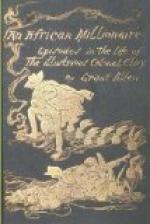“Confederacy!” he muttered, half to himself. “Confederacy!”
The Seer turned to him with a sullen air. “You want a better sign?” he said, in a very impressive voice. “A sign that will convince you! Very well: you have a letter in your left waistcoat pocket—a crumpled-up letter. Do you wish me to read it out? I will, if you desire it.”
It may seem to those who know Sir Charles incredible, but, I am bound to admit, my brother-in-law coloured. What that letter contained I cannot say; he only answered, very testily and evasively, “No, thank you; I won’t trouble you. The exhibition you have already given us of your skill in this kind more than amply suffices.” And his fingers strayed nervously to his waistcoat pocket, as if he was half afraid, even then, Señor Herrera would read it.
I fancied, too, he glanced somewhat anxiously towards Madame Picardet.
The Seer bowed courteously. “Your will, señor, is law,” he said. “I make it a principle, though I can see through all things, invariably to respect the secrecies and sanctities. If it were not so, I might dissolve society. For which of us is there who could bear the whole truth being told about him?” He gazed around the room. An unpleasant thrill supervened. Most of us felt this uncanny Spanish American knew really too much. And some of us were engaged in financial operations.
“For example,” the Seer continued blandly, “I happened a few weeks ago to travel down here from Paris by train with a very intelligent man, a company promoter. He had in his bag some documents—some confidential documents:” he glanced at Sir Charles. “You know the kind of thing, my dear sir: reports from experts—from mining engineers. You may have seen some such; marked strictly private.”
“They form an element in high finance,” Sir Charles admitted coldly.
“Pre-cisely,” the Seer murmured, his accent for a moment less Spanish than before. “And, as they were marked strictly private, I respect, of course, the seal of confidence. That’s all I wish to say. I hold it a duty, being intrusted with such powers, not to use them in a manner which may annoy or incommode my fellow-creatures.”
“Your feeling does you honour,” Sir Charles answered, with some acerbity. Then he whispered in my ear: “Confounded clever scoundrel, Sey; rather wish we hadn’t brought him here.”
Señor Herrera seemed intuitively to divine this wish, for he interposed, in a lighter and gayer tone—
“I will now show you a different and more interesting embodiment of occult power, for which we shall need a somewhat subdued arrangement of surrounding lights. Would you mind, señor host—for I have purposely abstained from reading your name on the brain of any one present—would you mind my turning down this lamp just a little? ... So! That will do. Now, this one; and this one. Exactly! that’s right.” He poured a few grains of powder out of a packet into a saucer. “Next, a match, if you please. Thank you!” It burnt with a strange green light. He drew from his pocket a card, and produced a little ink-bottle. “Have you a pen?” he asked.




